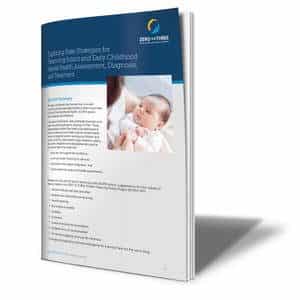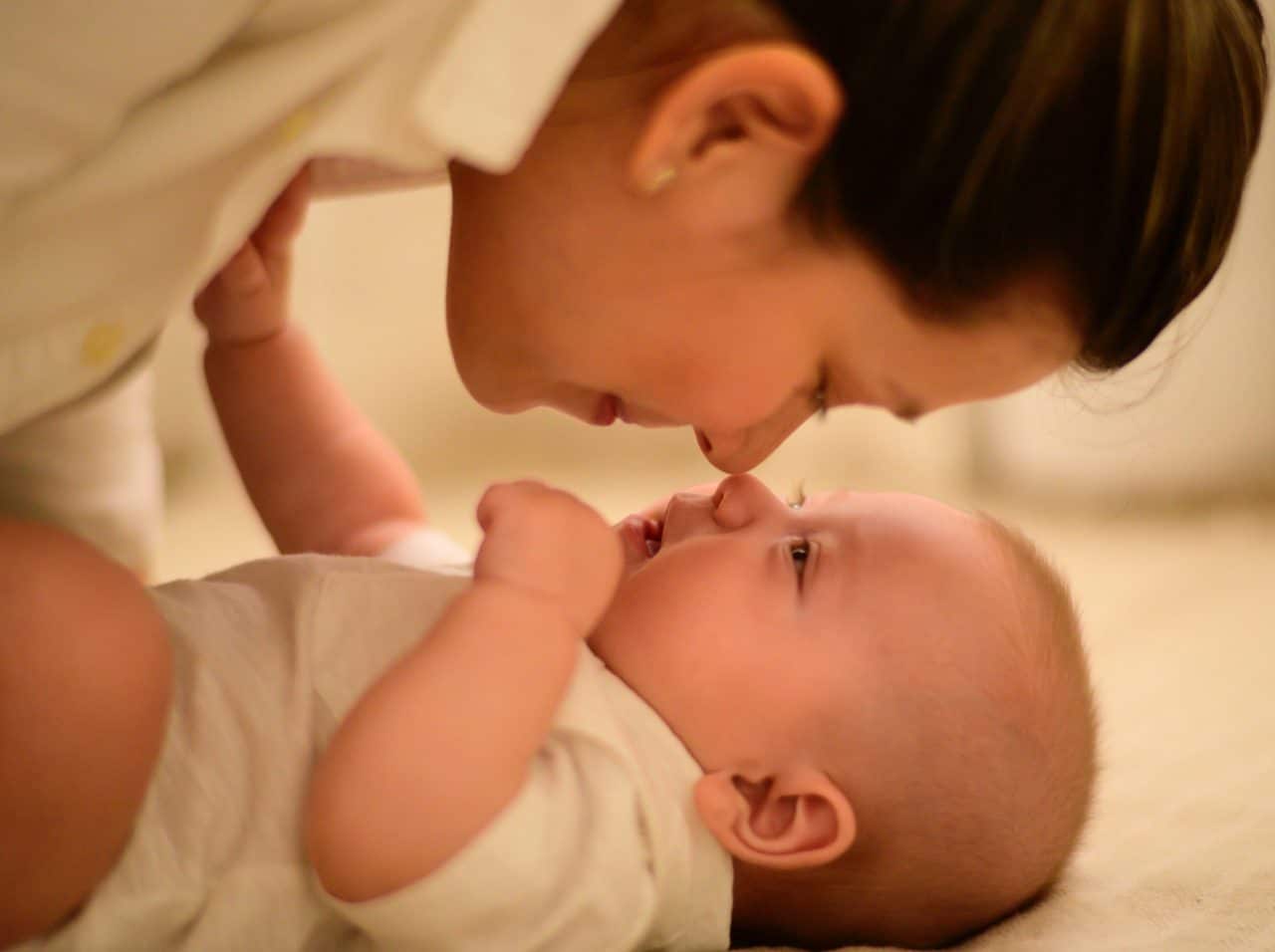This article summarizes key themes from Minnesota’s role in a convening of states and jurisdictions centered around improving state policies supporting Infant and Early Childhood Mental Health assessment, diagnosis, and treatment.
 Children’s earliest experiences impact their brain formation and in turn, their social and emotional, physical, cognitive, communication, and sensory and motor skills development. Recognizing the tremendous opportunities and risks associated with this critical time, states are increasingly investing in promoting infant and early childhood mental health (IECMH), defined as the capacity of a child from birth to age five to experience, express and regulate emotions; form close, secure interpersonal relationships; and explore his/her environment and learn, all within the context of family and cultural expectations. ZERO TO THREE released two papers in 2018 and 2019 highlighting strategies states are employing to support children’s IECMH. Highlights from Minnesota include:
Children’s earliest experiences impact their brain formation and in turn, their social and emotional, physical, cognitive, communication, and sensory and motor skills development. Recognizing the tremendous opportunities and risks associated with this critical time, states are increasingly investing in promoting infant and early childhood mental health (IECMH), defined as the capacity of a child from birth to age five to experience, express and regulate emotions; form close, secure interpersonal relationships; and explore his/her environment and learn, all within the context of family and cultural expectations. ZERO TO THREE released two papers in 2018 and 2019 highlighting strategies states are employing to support children’s IECMH. Highlights from Minnesota include:
- In a section focused on how states have explicitly called for the use of DC:0–5™ (a diagnostic classification of mental health and developmental disorders of infancy and early childhood published by ZERO TO THREE) in state policy, Minnesota’s progress is highlighted. As part of a larger state initiative to expand IECMH services, Minnesota changed Medicaid regulations in 2011 to require that providers use DC:0-3R (and subsequent revisions), with a state-provided billing crosswalk, as the diagnostic assessment for children less than 5 years old. This change was made as part of a revision of Medicaid outpatient rules. After considering what it takes to use the DC:0-3R to diagnose effectively, Minnesota enacted an extended diagnosis rule for complicated clients over the lifespan (birth through seniors) that allows providers to assess a child or adult over three sessions and receive a higher reimbursement for that assessment. This represents more sessions than are typically covered for the diagnosis process. Minnesota Medicaid also covers dyadic therapy (family psychotherapy) across the lifespan if it is medically necessary as documented in the diagnostic assessment.
- In a section that illustrates how states are using DC:0–5 in their early intervention systems, Minnesota’s work is described. Since its last rule revision in 2006, Minnesota has maintained a moderate (medium) definition of developmental delays as categorized by the Early Childhood Technical Assistance Center. An infant or toddler may be determined eligible with a delay of -1.5 standard deviations in any one of five domains of development or a diagnosed physical or mental condition that has a high probability of resulting in developmental delay by kindergarten if intervention is not provided. In addition, Minnesota has chosen to use all categories of eligibility included in Part B of IDEA as an option for determining eligibility for infants and toddlers. Guidance has been provided by the state to clarify which diagnoses are included as “established conditions.” Some DC:0-3 conditions were included in that guidance. The State of Minnesota officially required the use of the DC:0–5 in place of the DC:0-3R in July of 2018. Prior to the official requirement of the use of the DC:0-5, the Minnesota Mental Health Division (Minnesota Department of Human Services) and the Department of Education began reviewing the diagnoses in the DC:0–5 to identify those diagnoses that would be considered conditions that constitute a high probability of delay. The list was finalized in June 2018.
- In a section describing the use of ZERO TO THREE’s DC:0–5 faculty guidance for classroom instruction, Minnesota’s Department of Human Services’ work is described. Minnesota has promoted this strategy by sponsoring statewide full-day training for higher education faculty on how to include DC:0–5 in pre-service and graduate coursework. Faculty participating in the training have come from 11 different universities across the state and represent the fields of psychology, psychiatry, developmental pediatrics, social work, clinical counseling, and marriage and family. Minnesota has also purchased DC:0-5 guidance materials for all relevant higher education faculty across the state.
- In sections on including DC:0-5 in cross-sector IECMH workforce development, Minnesota’s multiple investments are highlighted. In addition to new Medicaid rules requiring the use of DC:0–5, Minnesota has invested in significant statewide training on the DC:0-3R (now DC:0–5), reaching more than 2,000 clinicians. At the same time, Minnesota provided training in three research-based interventions (Parent Child Interaction Therapy, Child–Parent Psychotherapy, and Attachment and Biobehavioral Catchup). Documented training in DC:0-3R/DC:0–5 is required before clinicians are admitted to the above trainings on treatment interventions. Since 2009, the state has made investments of more than $15 million through state appropriations and Community Mental Health Block Grant Funds in training the early childhood mental health workforce in evidenced-based assessment and treatments, as well as serving children and their families who are uninsured and underinsured. The purpose of this DC:0-5 training is to ensure that clinicians know how to use the tool, how it is suited to the developmental needs of young children, how to document it for billing purposes, and how to do billing. They have also incorporated a full day of developmental training prior to the 2-day DC:0–5 training to provide context and increase provider awareness that this is clinically the appropriate diagnostic instrument. Clinicians who attend the 3-day DC:0–5 training are then eligible to participate in a monthly consultation group to hone their assessment skills. Professional development opportunities are offered for free, and the state offers grants to cover billed hours that clinicians lose to participation. Successful completion of the trainings is required. Additionally, Minnesota offers foundational infant mental health training to child care providers as part of qualifying for the child care quality rating and improvement STAR system. This is tied to the state’s early childhood mental health consultation effort. Participation helps child care providers accrue continuing education units (CEUs), and it also helps them to climb the child care career lattice.
- In a section on extending the reach of services, Minnesota’s recognition of, and solutions for, clinician burnout are described. Minnesota saw that clinicians burn out if they are in the clinic 100 percent of the time. Because of this, the state encourages clinicians to divide their time between clinical work and consultation. Being a consultant, though, requires a higher skill set, as one has to be fully competent in clinical work first, and be able to teach, guide, and mentor other providers.
- Finally, one section fully describes Minnesota’s Golden Thread. The Golden Thread is a systems approach that focuses on helping provider groups understand the links between assessment, diagnosis, medical necessity, treatment, review, and discharge. It involves training clinicians, ensuring they are certified; providing consultation to support compliance with Medicaid documentation standards; offering an ongoing diagnostic support group where clinicians are required to present six cases over time to receive feedback and build capacity to effectively use the DC:0-3R/DC:0-5; and aligning Medicaid policy to support payment of services.
Learn more about how Minnesota and other states are promoting IECMH in Advancing Infant and Early Childhood Mental Health: The Integration of DC:0–5™ Into State Policy and Systems and Exploring State Strategies for Financing Infant and Early Childhood Mental Health Assessment, Diagnosis, and Treatment.


